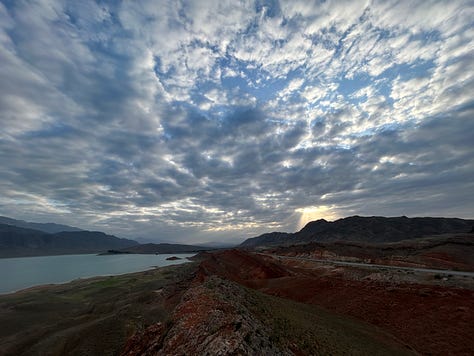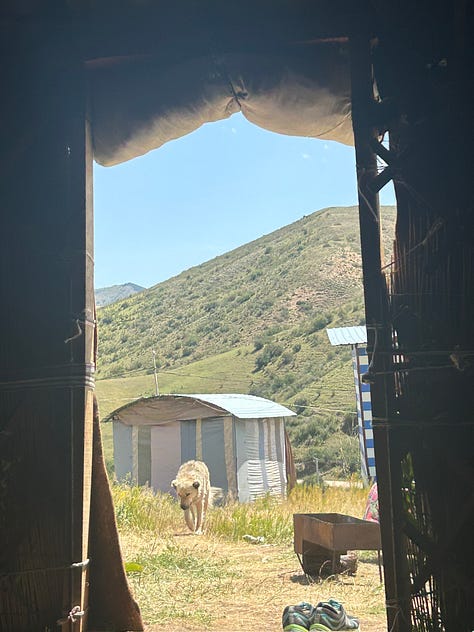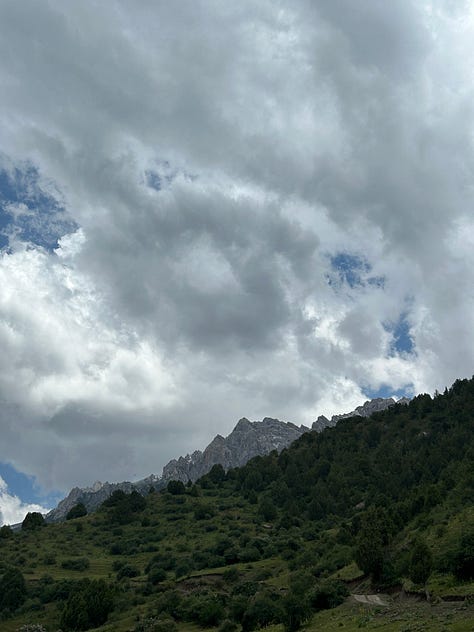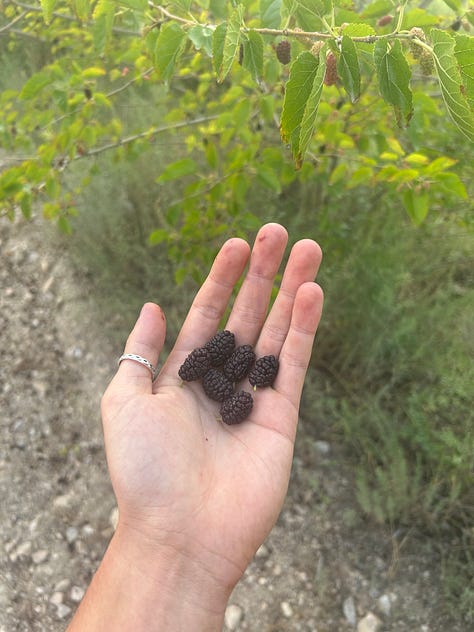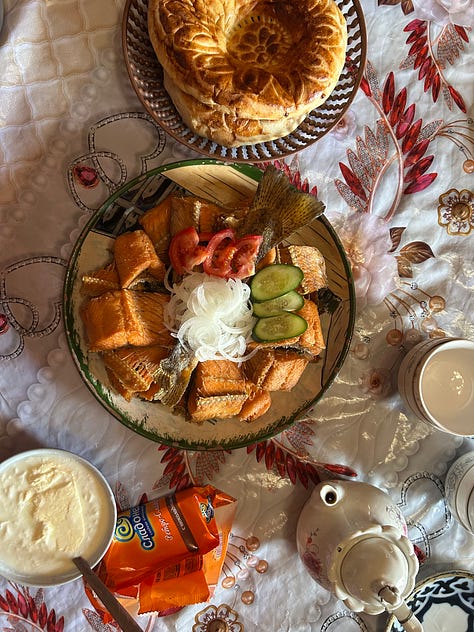We’re in Batken, today, visiting Aftan, where we woke up at seven and set out for the mountains. We met Baiel at the store and picked up Tursunai from her grandparent’s and stopped for a nan and a coffee before driving out past the reservoir where we’d walked last night around sunset. We slowed down for the view and to point out the place where the border maps once marked the Tajik village as Tajik, which is now the place where the border maps mark the Tajik village as Kyrgyz, which is right, I’ve been told, inasmuch as the land itself is, and has been, deemed Kyrgyz and inasmuch as the people are, and have long been, Tajik. More than that, though it seems right because now, here, there is a sense of possible peace, after many years of skirmishes and violence and, at times, even war.
After that we came around the bend and noted the soldier, armed, watching cars pass from the hill above, and the mountains, to our left, where it was mentioned that there had once been a garrison, hidden, unknown to those who didn’t have fathers who were privy to it. We stopped at the river, then, by the village which had been shelled for its water which fed the reservoir which we had passed at our outset, for an explanation of its history and a picture, which we designed to take quickly but resorted to taking not-at-all after the soldiers there approached our car and asked Aftan for his passport and Baiel for his license and Leah and I for our IDs and Tursunai for her profession before exchanging some short pleasantries with me in whatever Kyrgyz I could muster and bundling us back into our white Toyota sedan and sending us forward, on our way, into the border regions which lack nations, on the map.
We drove for a while, then, and turned left at Lagman No. 1 where Aftan told us we would stop, later, for lunch, because it was the restaurant that was owned by his family. Turned left and began our dirt-road climb into the mountains, where we pulled over to ask where to park and got cackled at—“we aren’t in Bishkek, are we?” they asked, by which to say anywhere, so we left the car where it was and set out at a run towards the ramshackle bridge to the level-setter at the center of the pond before turning back to the yurts where we were to sit for lunch. Fish, today, but not before making a friend of a sheepdog and avoiding another pack of police. This time, however, they were poking around for reasons more familiar to me. It was graduation, yesterday, and last night a high schooler had died on this road, making his way to the mountains for festivities. They were checking, that is to say, for IDs to keep teens off the roads.
After lunch we went to the waterfall––a short hike, but steep and clambering until we reached the point where the rocks got too slick to hold, even with our hands. We sat there, for a long while, and looked at the clouds and talked about our dreams. How in Aftan’s he owns and restaurant and in Leah’s she walks through her house and sees monsters and in Tursunai’s she’s covered entirely in snakes. We thought to climb up, then, around the backside of the falls, to the top, but Aftan stopped us and said it was dangerous, that we should turn around and head back home. There were wild boars, there, at the top, and clouds, even further above.
It began to rain, then, on our way back down, and it’s raining now, in Batken, which is to say that the rain arrived here in town much later. This afternoon, however, we were racing the storm down the mountain, Aftan in the front-right seat, steering us fast down the dirt road while Leah, Tursunai and I bounced around in the back, passing a bottomless bag of cherries between our three laps, spitting pits out the window into the ditch to our right
We turned back onto asphalt when we came out of the mountains. Dry mostly, and so we put our heads out the windows and turned back to look out at the clouds, and the mountains, and the rain. We continued west, then, towards Leylek, where Bekzhan is from and where we stopped for a picture next to the group of ten friends, dancing and singing with a mic next to their van in celebration of the 30th year since their graduation.
In Leylek we turned around, setting our sights on Batken and driving east on the highway that looked very much like the sorts of highways I drive in New Mexico, albeit with mountains much taller in the distance. We stopped, this time, at Lagman No.1 for a meal and conversation. Kuurdak and tea before Aftan insisted that I drive us on our way back towards the city, and so I did. It was unfamiliar, at first, but not overwhelmingly strange, to be driving from the right side, fast, until he directed me to hang a right onto dirt, to take us to his grandmother’s farm.
We waited outside there, picking cherries from the tree while he said hello to his grandmother from his mothers side. She kissed us, then, once on each cheek, before bidding us farewell. And so we drove, again. Past the river and the village and the soldiers and the hill where we stopped, on the side of the road, to get buzzed by semis and eat wild mulberries off the bushes that grew out from the ditch.
We arrived back in Batken in the evening. Dropped Baiel off at this car and Tursunai off with her grandparents, where we said goodbye to her for who knows how long. Stopped back at the house to put leftovers in the fridge and set out again, this time for town center, to pick Aftan’s sister up from the family store. They sell many things, there, most importantly CCTVs, which Aftan and his father also know how to set up. Many, around, knew how to wire the cameras, but Aftan, for years, was the only person in town, he explained, who knew how to manage the settings. The cameras, he asked, at the river, in the village—did we remember them? He'd programmed the settings when he was in ninth grade, all himself, wired them up to send footage direct to Bishkek, to the White House, to the presidential palace. He’d maintained them for years, alone, until teaching his father to do the same when he moved to the US for FLEX and to Bishkek, this year, to attend NGA.
It was nighttime, then, by the time we got back to the house, and we had a short dinner before heading out to the shed. There were stacks, there, of walnuts and apricots, dried from last season. We had to bag them, quickly, for pickup around ten p.m. And so we did, Aftan and his sister Dzhumagul and me, rolling the edges of the plastic sacks and tapping each bin of apricots against the side to funnel them into the bags until full, each some 27kg deep of fruits and stones. We hauled them, then, the many bags of fruits from last season, into the truck that pulled in through the gate into the long driveway next to the corn patch and rabbit hutch and chicken coup, where the two men who leered at me and got “too religious” (as per Aftan) about my tats weighed them up and marked them, each bag, on a loose scrap of paper while Dzhumagul cracked us walnuts.
It's raining, now, as I type. I leave here in a week.
On the last of the month we will take a taxi to Osh. On the first, I will fly to Bishkek, and on the fifth, to New York. It’s all passed, all passing, so quickly. The departure, now, is so soon. I hope it will not be too long before I may come back.
-M



